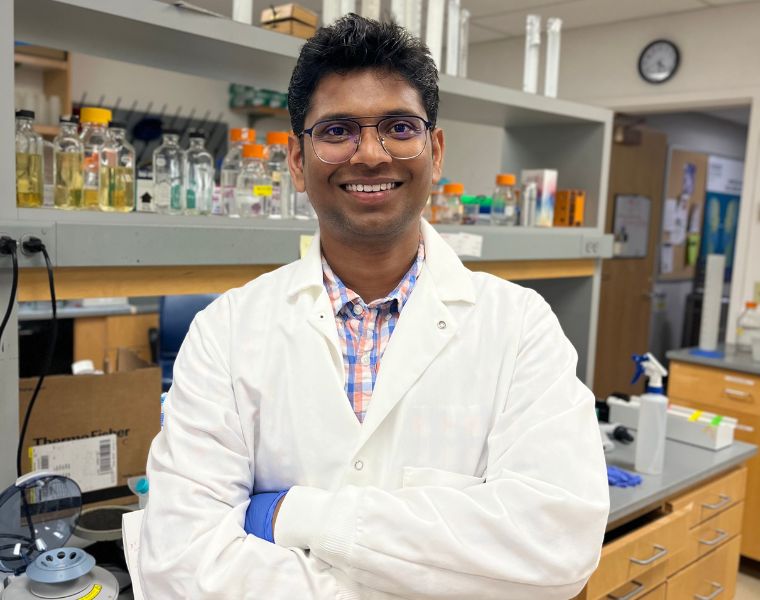To recognize the contributions postdoctoral researchers make to Case Western Reserve University—and their respective fields—The Daily has partnered with the Office of Postdoctoral Affairs to highlight their efforts in a new monthly series.
Shashi Singh, a postdoctoral scholar in the Department of Biochemistry, was recently elected senior co-president of Case Western Reserve University’s Postdoctoral Association. His election comes a year after arriving at the university, where he immediately became involved with the organization, serving as chair of the Social Activity Committee and representing postdocs on the Faculty Senate Committee on Information Technology.
In his new role, he plans to voice the concerns of postdocs to create the best environment to foster their development. Singh said the role also is helping him develop into a well-rounded leader and mentor.
His service to the university community isn’t limited to the Postdoctoral Association; he also is a representative for the Faculty Senate and Intercouncil Leadership and a judge for the Support of Undergraduate Research and Creative Endeavors summer research applications and Intersections poster session.
In the lab, Singh works with Joseph M. Luna, assistant professor of biochemistry. Singh researches the mechanisms of RNA viruses and host cell battlefields and applies those insights to generate novel RNA therapeutics. His work is specifically focused on RNA editing and its potential to treat diseases such as cancers by altering gene expression at the transcript level. He is working on engineering a new kind of guide RNA that is effective at recruiting the cell’s own editing enzyme to make edits at a precise target RNA region. Singh’s research aims to provide a simple delivery of just a small piece of RNA inside the cell and repair or create mutations in vivo without the need to provide any extra enzymes. He is hopeful that this work will open the door even more for RNA editing as another gene therapy tool.
Before coming to CWRU, Singh researched aging of skeletal muscles during liver disease at Cleveland Clinic; his work was published in the reputed journal Cell Physiol Biochem, where he was listed as a lead author.
He also has been a co-author on three papers recently published in iScience, The Journal of Physiology and Aging Cell.
In addition to his work at the university, Singh is a volunteer serving on the editorial board of Cell & Cellular Life Sciences Journal and BMC Research Notes, a reviewer for numerous reputed journals.
Singh recently reflected on his experiences as a postdoc.
Answers have been lightly edited for length and clarity.
1. What has been the best experience so far as a CWRU postdoc?
My best experience as a postdoc at Case Western Reserve University has been the support and freedom provided by my principal investigator (PI), Dr. Joseph M. Luna. He has encouraged me to think critically and discuss ideas, as well as help me channel those ideas toward implementation. This has enabled me to collaborate with postdocs from different departments, allowing me to approach questions from different angles and work toward effective solutions.
I am also incredibly thankful for the support I have received from Felicia Moss, director of postdoctoral affairs at the Office of Postdoctoral Affairs. She has been an invaluable resource in creating an environment conducive to postdoctoral success, providing a wealth of resources on the [Postdoctoral Association] website and offering opportunities to attend National Postdoctoral Association conferences to make national connections and further develop leadership qualities.
Overall, the supportive and collaborative environment, opportunities for professional development and networking at CWRU has been a great experience for me as a postdoc and I am deeply appreciative of all the help I have received since my joining last year.
2. What’s your best piece of advice on how postdocs can make the most of their postdoc career and prepare for their future goals?
Identify your career goals and actively plan for them. Take the time to research potential employers and positions that align with your goals and create a plan for how you will approach them.
Develop a strategy to build your network. Networking is key for any postdoc and can be done through attending conferences, connecting with alumni, utilizing professional networking sites, and meeting with mentors.
Take advantage of learning opportunities. Postdocs often have access to unique training programs and workshops to develop their skills. [Use] these resources to stay ahead of the curve.
Participate in professional development activities. Whether it’s attending a conference or joining a professional society; staying up-to-date on the latest research and trends can help you stay competitive.
Prioritize self-care. It’s important to stay physically and mentally healthy during your postdoc experience. Make sure to take regular breaks and build in time for yourself.
3. What are your career goals after your postdoc?
After my postdoc, I plan to pursue a career as an independent scientist in my area of research. I am passionate about my research, and I am eager to continue exploring and discovering new knowledge. In the future, I hope to contribute to the advancement of science and technology by developing innovative solutions to real-world challenges. Furthermore, I want to share my knowledge and expertise with other scientists and students, and to help educate the next generation of scientists. I am also passionate about teaching and mentoring, and I would love to be able to continue doing so in my future career.

